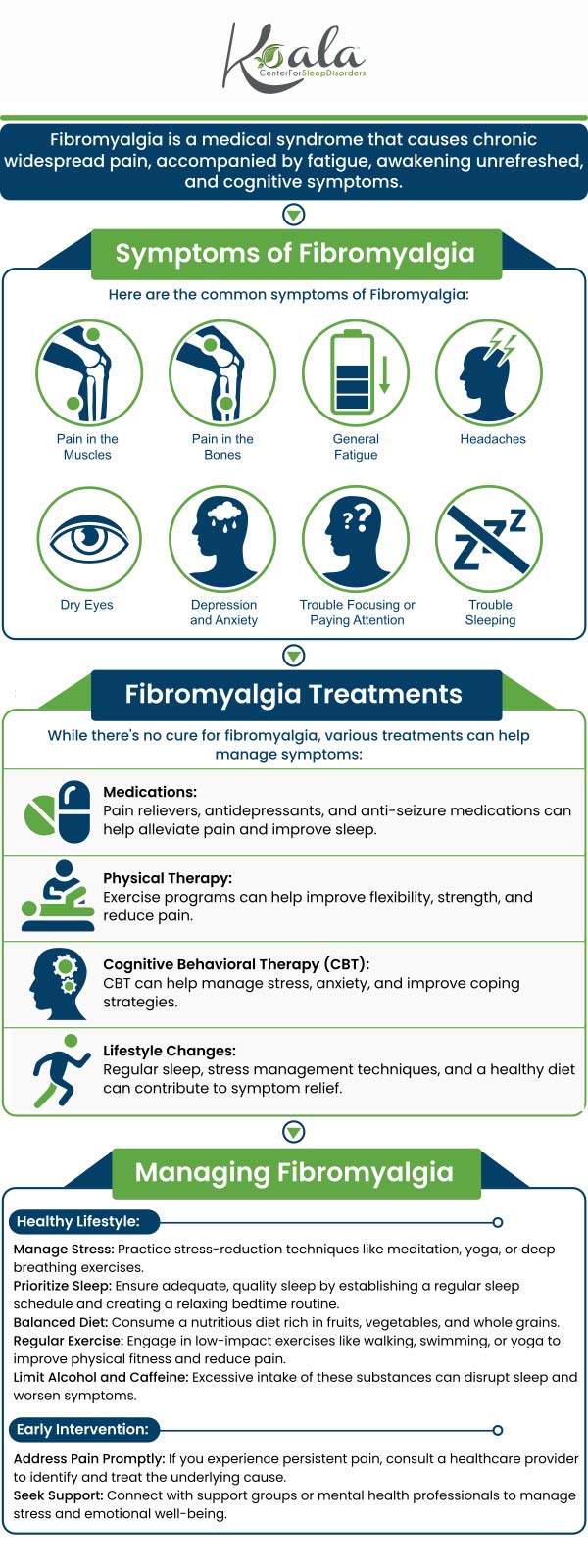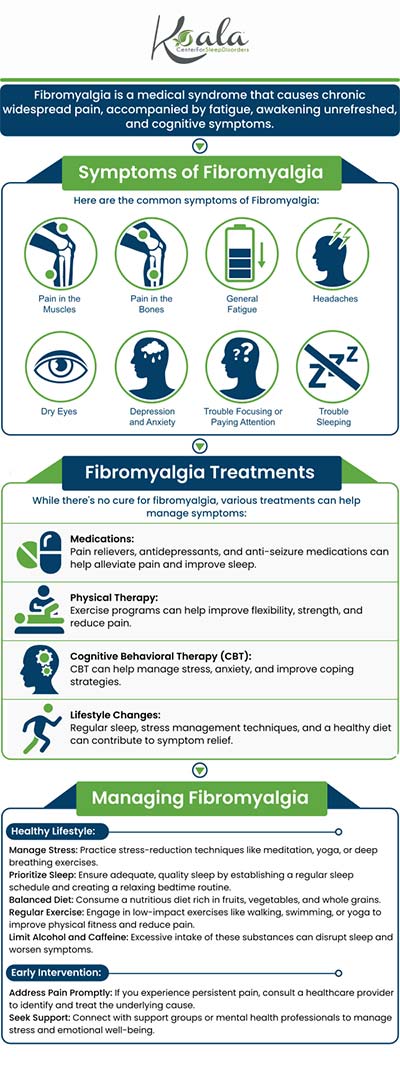Find Relief from Fibromyalgia Pain With Better Night’s Sleep
It is common for patients suffering from fibromyalgia to also struggle to get a good night’s sleep on a daily basis, not only resulting in them suffering from daytime tiredness but also causing the other symptoms associated with fibromyalgia to worsen, making the condition that much more difficult to manage. Treating a sleep disorder in patients who have fibromyalgia will likely result in being an effective treatment for the fibromyalgia itself, making sleep clinics an integral component of fibromyalgia treatments for many patients. Contact Koala® Center For Sleep & TMJ Disorders for more information or book an appointment online. We have convenient locations across the U.S. in Bloomington IL, Peoria/Dunlap IL, El Paso TX, and Wausau WI.




Table of Contents:
Why do people with fibromyalgia not sleep well?
Is fibromyalgia caused by sleep disorder?
How can I get a good night’s sleep with fibromyalgia?
How can a sleep clinic help with Fibromyalgia pain?
One of the most common symptoms of fibromyalgia is sleep problems, with the majority of those diagnosed with fibromyalgia also being diagnosed with insomnia, with both conditions having a bidirectional relationship. This means that if one worsens, the other is likely to worsen as well. Another common symptom of fibromyalgia is lowered pain tolerance, making them more likely to experience pain that will make it difficult for them to fall asleep and stay asleep, leading to insomnia and poor-quality sleep. This has been shown to worsen other symptoms of fibromyalgia, increasing sensitivity to pain, resulting in both conditions causing the other to worsen. Data also shows that those suffering from fibromyalgia are likely to experience wakefulness throughout the sleep cycle during the non-rapid eye movement (NREM), making them unable to achieve restful sleep during that time, leading to increased daytime sleepiness even if they slept through the entire night.
The actual cause of fibromyalgia remains unknown, but there are some associated possible triggers that will cause someone to be at an increased risk of developing the condition, including a specific event that leads to physical or psychological stress or suffering from a sleep disorder. Studies have also shown that the majority of patients diagnosed with fibromyalgia also have a diagnosable sleep disorder, and the symptoms of both are likely to lead to the worsening symptoms of the other. So, while there is no direct correlation of a sleep disorder being the cause of cases of fibromyalgia, they can be definitively linked to one another. Studies have shown that suffering from a sleep disorder can make patients up to 3 times more likely to develop fibromyalgia.
It is very important for patients suffering from fibromyalgia to be able to get a good night’s sleep to help them manage their symptoms more easily throughout the day, so treating insomnia also often leads to providing relief for the other symptoms associated with fibromyalgia. Some ways that patients can help to improve their quality of sleep include maintaining a set sleep schedule to make sure that they are going to bed and waking up at the same times every day, making it easier for the body to get enough sleep throughout the night in order to sufficiently repair itself to be well-rested and healthy throughout the day. Exercising regularly will also work to lessen the flare-ups of fibromyalgia while simultaneously helping the patient get a good night’s rest. It has also proven to be beneficial to remove as many stimuli and anxiety-inducing factors around bedtime, meaning that it might be good to have a relaxing nighttime ritual that you do before bed that does not involve watching TV or being on your phone, and avoiding the consumption of food or beverages that are high in sugar or caffeine. Many patients with fibromyalgia also find that sleeping on a firmer mattress helps to lessen the symptoms of pain that are often associated with the condition.
A sleep clinic will be able to diagnose and determine whether a sleep disorder is at play affecting your fibromyalgia pain, as well as the cause of the sleep disorder, as treating the sleep disorder will have a direct positive influence on the pain experienced. Many people with fibromyalgia suffer from sleep disorders including restless leg syndrome or sleep apnea, both of which are regularly treated through a sleep clinic. Improving your quality of sleep will help to lessen all of the other symptoms that are frequently experienced with fibromyalgia, making managing the other symptoms significantly easier.

Additional Services You May Need
▸ KoalaKIDZzz®
▸ Sleep Apnea
▸ Snoring
▸ TMJ Disorder
▸ Fatigue
▸ Sleep Disorders
▸ Weight Loss
▸ CPAP Alternative
▸ Oral Appliances




